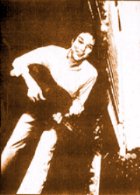Leo Kottke's Making A Joyful Noise
by Charles M. Young
 |
New York -- Leo Kottke started out on Oblivion Records, and until recently, a lot of fans were wondering if he was returning there. To oblivion, that is. Not that he was doing the usual rock & roll number of a gram up each nostril and a quart of tequila to take off the edge. No, the guy looked healthy enough. The same boyish smile greeted you on his album covers. In concert, his speech betrayed no brain damage.
But he was leaving all these disturbing little clues. Back in the early Seventies, when word was spreading from dormitory room to dormitory room about this unbelievable new guitarist who was so great he didn't even need a band, Kottke was doing songs like "When Shrimps Learn to Whistle" -- a little weird, you figured, but clearly this guy had extraordinary faith in the future. By 1978, however, something had changed. Kottke released Burnt Lips, which opened with "Endless Sleep," "Cool Water," "Frank Forgets," and "Sonora's Death Row" -- a series of songs so depressing they should be heard only when immobilized by Thorazine. And in 1979, he put out the inaccurately titled Balance, which included "Losing Everything," "Drowning," "Whine" and liner notes about steeping in dogshit, getting a sled for Christmas in Oklahoma and succumbing to despair. Was America's heavy-weight-champion twelve-string guitarist going to snuff it?
"A lot of people have commented on that," admits Kottke, searching his New York hotel room for the paycheck from his previous night's performance at Town Hall. "I really didn't feel that glum. Well, I remember a writer discussing the experience of having people as him, 'How could you do it, expose yourself so badly?' If you're careful not to reveal, not to make a fool of yourself, then there's no writing taking place at all. I'd like to deny any autobiographical content, but I can't. Did you ever read the first volume of Arthur Rubinstein's autobiography? He talks about trying to hang himself, but the necktie broke
and he staggered out of the closet laughing.![]() Now he's permanently full of joy from the experience.
Now he's permanently full of joy from the experience.
"I feel better now than I have for twenty years. I just don't fight myself anymore. I'm resigned to all this, uh, splendor in the world. I enjoy reading because I can let the writer do the questioning for me. I don't reject anything anymore. Everything is too complex to impose an order on it."
Leo Kottke's change of heart is evidenced by his new, all-instrumental album, Guitar Music, his fourth LP since he switched from Capitol to Chrysalis in 1975. Reminiscent of 6 and 12 String Guitar, the Takoma album that made him a contender, Guitar Music inspires no thoughts of suicide. Indeed, on some cuts, it is even happy and energetic. It has a cover of Ry Cooder's joyous "Available Space" and an equally joyous original called "Little Shoes."
"I'm glad you picked that out," says Kottke, searching his coat pockets for the third time. "That's supposed to pick you up after 'Strange,' which is abut Rob Collins, my soundman in Europe. He was part of this Osmond Brothers-style group in Wales and had to play a pub in a town where a slag heap had collapsed and inundated the local grade school, killing an entire generation of children. The audience was packed with bereaved parents, and he had to act happy onstage. I've played some rough situations, but nothing like that."
So what has Kottke been doing to achieve his newfound freedom from morbidity? "God, what have I been doing?" he says. "This will be a short article. I sit around waiting for tunes to come along." Surely there must have been something else? Kottke ponders a moment, then answers: "I started rebuilding engines. I saw some Louise Nevelson sculptures and thought I'd like to try it myself. I looked under the hood of my Alfa, and it looked just like a Louise Nevelson sculpture, so I took it apart.